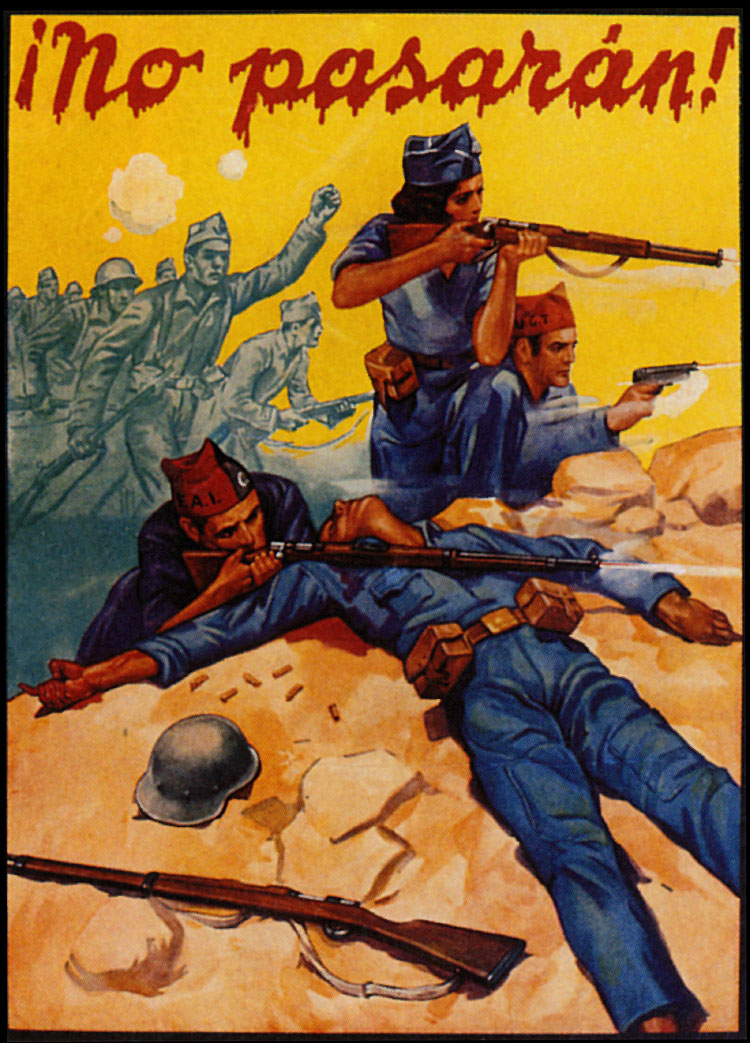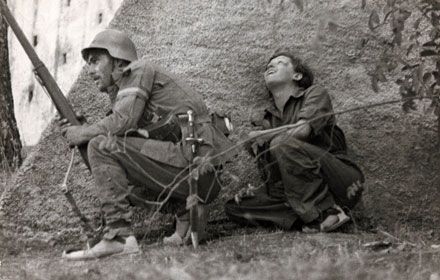 |
| The slogan, "they shall not pass!" was originally spoken by a French general at the Battle of Verdun |
volunteers who fought to defend the Spanish Republic in
the Civil War of 1936-1939, participated in a 1981 march
on Washington against Reagan's support for the
repressive regime in El Salvador, wearing their
exotic berets and carrying their banner.
A young protester said to a former officer of the ALB,
"We have the same heart. I hope my generation has
the same courage as yours."
Most literate people probably remember the character
Robert Jordan from For Whom the Bell Tolls.
If your life has been celebrated in a major novel of
the century and in a film where you are portrayed by
Gary Cooper, you may have done some memorable
or courageous things yourself. Or people may forget
your real name and that your short, heroic and tragic life was
not fiction.
In 1936, 27 nations signed the Non-Intervention Agreement to state their neutrality in regard to the Spanish Civil War (really a military coup that became three years of class war), imposing an arms embargo. It didn't work out because Germany and Italy sent troops, airplanes, supplies and armor to General Francisco Franco's "Nationalist" forces, and the USSR did the same for the Republic, the formula for a proxy war between major powers.
Initially, the milicianos of various unions and parties faced Franco's experienced African Army which was strongly augmented by dozens of divisions of well-trained and -equipped Axis troops, confronting that formidable opposition with leftover World War I weapons and never enough air power or artillery. 35,000 people worldwide heard a call they could not resist to come to the aid of the Republic in this grossly unequal fight. They were called the International Brigades, streaming in from England, Poland, Belgium, France, Canada, Italy, Austria and the Balkans; there were several thousand from the United States in two battalions (the Washington and the Lincoln). Their arrival saved Madrid from Franco early in the war and gave a hopeless cause great hope.
They, the milicianos, some Russian fliers and regular troops then advanced to contain Franco's Nationalists on the banks of the Jarama in early 1937, but at a horrific cost to the International Brigades. The Axis artillery, air power and armor took another huge toll in the Brunete offensive later in the year when the IB lost another 4300.
 |
| Robert Merriman, third from the left |
As Soviet support dwindled and Axis bombers pounded the defenders and civilians both indiscrimately and relentlessly, the Nationalists pushed toward Catalonia. The remants of the Lincoln Brigade (now merged with the Washington and under the 15th IB) couldn't hold any high ground and were lying low in a vineyard near the town of Gandesa in August 1938. When Merriman left cover to organize his men, he and LT Edgar Cody were cut down by machine gun fire.
 |
| The last salute of the International Brigades at Montblanch |
 |
| Photojournalist Gerda Taro did not survive the war |
"Sheer force can trample the human spirit underfoot..." -- Albert Camus

What if they gave a war and no one showed up?
ReplyDelete